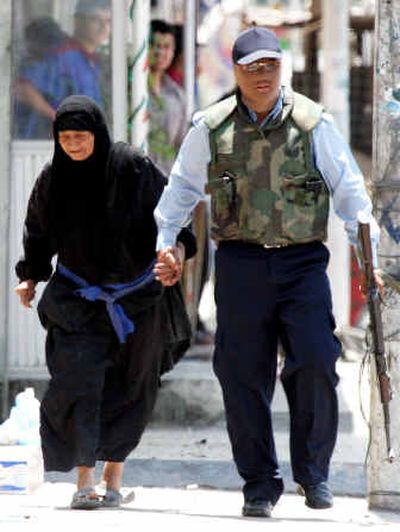Monastery bombing kills nine

BAGHDAD, Iraq – Sectarian violence appeared Friday to be embroiling more of Iraq’s fractious religious groups, as authorities reported a suicide bombing that killed nine persons at a Sufi place of worship north of Baghdad.
Witnesses said a minibus packed with explosives crashed into the outer wall of a monastery outside the northern town of Balad shortly before sundown Thursday. More than 40 people, some of them children and all of them adherents of a Sufi branch of Sunni Islam, had gathered inside the monastery, the witnesses said. When they rushed outside upon hearing the sounds of the crash, the minibus driver detonated his payload.
In addition to killing nine persons, the explosion wounded 12 and blew a massive hole in the cinderblock wall surrounding the monastery’s courtyard. Among the dead were the owner of the monastery and four of his sons, said a fifth son, Edris Ayash, who survived the attack.
“This is one of the attempts to provoke sectarian conflict,” Whayib Muhammed, 47, another witness, said Friday. “But we are all Iraqis, and it wouldn’t work.”
It was not immediately clear what motivated the attack or who carried it out. During weeks of gradually intensifying violence between Iraq’s Shiite Muslim majority and Arab members of the Sunni minority, the comparatively tiny Sufi sect has not been a common target. Although Iraq’s Sufis generally consider themselves part of Sunni Islam, they practice a mystical form of Islam that is distinct from the Sunni mainstream and is rejected by the more austere, hard-line Sunnis who form the core of the insurgency in Iraq.
Sectarian violence has intensified in the months since elections at the end of January gave Iraqi Shiites a majority of the seats in the new National Assembly. The Shiites and their coalition partners, Iraq’s ethnic Kurds, formed a government in late April, shifting power to two groups that were persecuted for decades by the Sunni-dominated government of Saddam Hussein. Sunnis, on the other hand, largely boycotted the January elections and now have scant representation both in the new assembly and on the committee recently formed to draft a new constitution.
Although Shiite and Kurdish leaders have repeatedly vowed to broaden the Sunnis’ role in the new government, more than 850 people have been killed since the government was formed. Much of the killing has been religiously motivated, and many of the victims have been Sunni and Shiite clerics.
Authorities on Friday reported the killing of another Shiite cleric the previous night in the southern city of Basra. Ali Abdul Hussein, the imam of the Zahraa mosque in Basra’s central Jubaila neighborhood, was gunned down by unknown assailants, according to witnesses.
“A car with two armed men inside it stopped in front of the house of the imam and shot him dead and then escaped,” said Mohammed Hayyawi, 48, a neighbor who said he saw the killing.
In the northern city of Kirkuk, meanwhile, a senior security official was shot and killed as he left a mosque after Friday prayers. The victim, Gen. Sabah Bahlool Qara Alton, an aide to the chief of internal affairs in Kirkuk, was an ethnic Turkman. Since the fall of Saddam, whose government drove Kurds from oil-rich Kirkuk and resettled the city with Arabs and Turkmen, the three ethnic groups have vied – often violently – for control there.